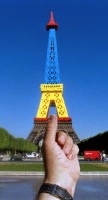Difference between revisions of "Souvenir"
(Created page with 'File:lighterstill.jpgright|frame ==Origin== French, literally, act of remembering, from Middle French, from (''se'') ''souvenir'' to r...') |
m (Text replacement - "http://" to "https://") |
||
| Line 3: | Line 3: | ||
==Origin== | ==Origin== | ||
French, [[literally]], [[act]] of [[remembering]], from Middle French, from (''se'') ''souvenir'' to remember, from [[Latin]] ''subvenire'' to come up, come to [[mind]] | French, [[literally]], [[act]] of [[remembering]], from Middle French, from (''se'') ''souvenir'' to remember, from [[Latin]] ''subvenire'' to come up, come to [[mind]] | ||
| − | *[ | + | *[https://en.wikipedia.org/wiki/18th_century 1782] |
==Definition== | ==Definition== | ||
*1: something that serves as a reminder | *1: something that serves as a reminder | ||
==Description== | ==Description== | ||
| − | A '''souvenir''' (from French, for a remembrance or [[memory]]), memento, keepsake or token of remembrance is an object a [[person]] acquires for the memories the owner associates with it. The term souvenir brings to [[mind]] the mass-produced [ | + | A '''souvenir''' (from French, for a remembrance or [[memory]]), memento, keepsake or token of remembrance is an object a [[person]] acquires for the memories the owner associates with it. The term souvenir brings to [[mind]] the mass-produced [https://en.wikipedia.org/wiki/Kitsch kitsch] that is the main [[commodity]] of souvenir and gift shops in many tourist traps around the world. But a souvenir can be any object that can be collected or purchased and transported [[home]] by the [[traveler]]. The object itself has no real significance other than the [[psychological]] [[connection]] the possessor has with the object as a [[symbol]] of [[past]] [[experience]]. Without the owner's input, the object's meaning is [[invisible]] and cannot be articulated. |
| − | In [ | + | In [https://en.wikipedia.org/wiki/Japan Japan], souvenirs are known as [https://en.wikipedia.org/wiki/Meibutsu meibutsu] (products associated with a particular region); and ''omiyage'', candies or other edibles to be [[shared]] with co-workers. Omiyage sales are big [[business]] at Japanese tourist sites. |
[[Travelers]] may buy souvenirs as [[gifts]] for those who did not make the trip. | [[Travelers]] may buy souvenirs as [[gifts]] for those who did not make the trip. | ||
[[Category: General Reference]] | [[Category: General Reference]] | ||
Latest revision as of 02:37, 13 December 2020
Origin
French, literally, act of remembering, from Middle French, from (se) souvenir to remember, from Latin subvenire to come up, come to mind
Definition
- 1: something that serves as a reminder
Description
A souvenir (from French, for a remembrance or memory), memento, keepsake or token of remembrance is an object a person acquires for the memories the owner associates with it. The term souvenir brings to mind the mass-produced kitsch that is the main commodity of souvenir and gift shops in many tourist traps around the world. But a souvenir can be any object that can be collected or purchased and transported home by the traveler. The object itself has no real significance other than the psychological connection the possessor has with the object as a symbol of past experience. Without the owner's input, the object's meaning is invisible and cannot be articulated.
In Japan, souvenirs are known as meibutsu (products associated with a particular region); and omiyage, candies or other edibles to be shared with co-workers. Omiyage sales are big business at Japanese tourist sites.
Travelers may buy souvenirs as gifts for those who did not make the trip.
